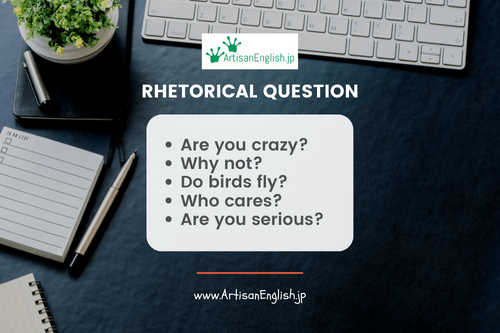
YouTube / iTunes / Spotify / Radio Public / Pocket Casts / Google Podcasts / Breaker / Overcast
Listen to ArtisanEnglish.jp posts & lesson intros here.
WotD: Rhetorical question
When someone asks you a question, they generally expect an answer.
Failing to receive one can be seen as an insult and anger them.
However, not all questions are asked to be answered.
That’s where rhetorical questions come into play.
A rhetorical question is asked to make a statement or trigger an emotional response that does not expect an answer.
For example, if you are having a terrible day, you may ask, “Why do these things always happen to me?” If someone were to reply by saying, “Well, you are lazy, have many bad habits and rarely plan things correctly,” you may tell them to shut up or try to punch their lights out.
That’s because you asked a rhetorical question and did not expect a reply.
You may have expected sympathy from the other person but not an answer.
Many people dislike public speaking, but a great way to elicit an emotional response from your audience while giving a speech is to ask a rhetorical question.
Many Americans are against free public healthcare funded by higher taxes, whereas most Canadians and I would go to war to protect our right to free public healthcare.
If I were giving a speech in support of it, I might ask Americans, “Do you want to die a slow, painful, expensive death?” or “Would you rather see your fellow citizens wallow in poverty due to a lack of health insurance, than help them in their time of need?”
These would be rhetorical questions asked to make them think of the consequences of not having a public healthcare system.
Flesch-Kincaid Readability Test
This post is understandable by someone with at least an 8th-grade education (age 13 – 14).
On the Flesch-Kincaid reading-ease test, this post scores 65.
The easier a passage is to read, the higher the score on a scale of 0 – 100.

